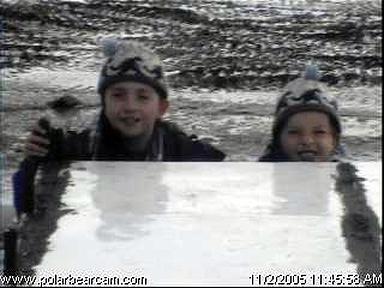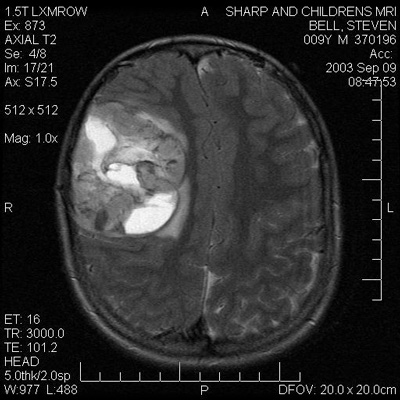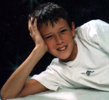Understanding Steven
Middle school is hell.
Steven loves middle school. I had fears of kids teasing or bullying him but that hasn't happened. He enjoys the challenge of a more advanced educational environment. He loves his teachers. He's getting A's and B's on his tests. What could go wrong?
In the words of Paul Harvey, here's the rest of the story.
First, there was the surgery to remove the tumor along with a margin of "normal" brain tissue.
Then radiation to his whole brain and spine. Then a howitzer blast of radiation to his right frontal lobe.
For the final act, his stem cells were harvested, and super high doses of poisonous carcinogenic drugs were infused into his blood stream. Then he got his stem cells back so that his bone marrow could rebuild itself for the next round. Times four.
Not surprisingly, all those insults to his nine-year old developing brain have taken their toll on his cognition, the price of admission to the Brain Tumor Survivors Club is steep.
Steven's mind is in the clouds, he is a keeper of odd knowledge like the distance between different planets, the differences between alligators and crocodiles, the reasons that dinosaurs aren't reptiles, why the pistol crab is the world's loudest animal, and more facts like that than I've ever thought of.
His teachers at school have understandably different ideas of what he ought to be doing during class. He reads like a demon, his favorite TV shows are things like "Walking With Dinosaurs", "The Planet's Most Extreme", and "Myth Busters".
He had some of these traits before treatment, but after treatment the daydreaming and distraction has been magnified.
On a typical homework day, he might sit down to start working. Then nature calls and he heads to the bathroom. On the way he notices something he lost sticking out from under his bed. He investigates and finds a boatload of other stuff he misplaced under the bed. He gets it all out and puts everything back in its place.
Some of the stuff goes back into his closet and he notices that the closet is a mess. So he cleans the closet and it's never looked better. Four hours have passed, it's time for bed, and he only did two of his ten assigned problems.
The experts like to say that Steven has attention deficit disorder (ADD), and it's radiation-induced.
After the results of a double-blind, placebo-controlled study conducted at St. Jude were published showing significant improvements in children who were treated with methylphenidate (ritalin), I decided to put my reservations against drugging Steven aside in the hope that it might help him a little. Under the care of a neurologist from St. Jude, we put Steven on Concerta (timed-release methylphenidate).
It seems to have helped, with no unacceptable side effects. Until middle school.
At the end of the first semester midterm grading period he had a D in English. The D was due to two missing assignments, the teacher forgave them and he got a B.
At the end of the second semester grading period, Steven had failing grades in Math, English, and Science. The same Steven who got straight A's in 5th and 6th grade. His test and quiz scores are A's and B's but he's got missing homework.
The reasons for missing the assignments are varied, but they all boil down to the wandering mind of a boy whose mind is filled with the mysteries of potato reproduction and pistol crabs and the release date of the next book in the "Warriors: Power Of Three" series.
So they call me in to discuss his failing grades and the school wants to pull him out of both his honors classes. They want to pull him from Art and put him in Resource (Special Ed).
I told Steven about this and he cried.
So he sets out, on his own, to get caught up. He tells me this is more important than Karate, his only extracurricular activity right now and the day afer he gets his orange belt he tells the instructor he can't come any more. He's carrying a double workload, in six weeks he keeps up with his regular workload and makes up six weeks of missing work.
In Math he turns in an assignment every day, which is stamped and handed back to him. After four assignments have been handed back, he is supposed to present the previously stamped assignments to the teacher, who records the grade on the homework and gives him a brief quiz.
He's been losing about half of his stamped assignments before she records the grade. So he gets docked for postponing the quiz and he comes home and does his current math homework and repeats the assignments he did earlier in the week but can't find and I say a prayer that he remembers to get the homework check done before he loses them again. He may not be working smart, but he's working hard.
This entire situation could have been avoided if someone would have taken the time to let me know there was a problem before he got so far behind. And instead of someone at the school figuring out what possible modifications could be made for him, they just want to yank him out of the classes he wants to keep and place him in Resource where he would be the only honors student.
Steven has been adamant through all of this about keeping his current classes, until last week. After staying up until midnight one night to get his homework done, including two assignments he'd already done but had lost, he tells me that maybe they were right after all about him not being an honors student.
Where's Mona Shaw when I need her?
Doug and I wrote a letter to the school (below). To be followed by an IEP meeting.
I'll be stocking up on Sarcasma before that meeting.
- Kathleen
Understanding Steven
Above is an axial (from the top looking down) MRI image of Steven Bell’s brain on September 9, 2003, three days after his ninth birthday and less than a week after he began third grade at Torrey Hills Elementary. The plum-sized brain tumor shown on the left of the image is in his right frontal lobe. The tumor-induced swelling in his brain was so great that by the time surgery could be performed 18 hours later, he was lapsing into a coma.
The tumor was found to be a supratentorial primitive neuroectodermal tumor (PNET), a highly malignant and aggressive form of brain cancer. After surgery to remove the tumor and a margin of surrounding brain tissue, he was treated at St. Jude Children’s Research Hospital in Memphis where he had radiation to his whole brain and spine, followed by a radiation boost to his right frontal lobe. After completing radiation his stem cells were harvested and he underwent four cycles of high-dose chemotherapy with stem cell transplant.
Steven continued to fourth grade when we returned to San Diego at the end of his treatment, despite the fact that he had missed almost all of third grade during his cancer treatments. Against his oncologist’s recommendations to repeat third grade, Steven was determined to stay with his class. He had a very rough time in fourth grade, but with tremendous personal effort and comprehensive assistance and encouragement from his teacher and his IEP case manager and the staff at Torrey Hills he persevered and when he returned to school in fifth grade, he once again began to excel on his own.
At the end of sixth grade he tested into honors pre-algebra and honors English, an achievement that, given his history, he is very proud of. Steven has always been academically focused and his interests led him to the state bowl with the Torrey Hills Future Problem Solvers. In seventh grade at Carmel Valley Middle School he participated in the Science Olympiad, placing in two of three events.
Compared to other brain tumor patients, Steven is doing exceptionally well now after treatment. On the average, pediatric brain tumor patients receiving the same dose of radiation as Steven lose approximately four IQ points per year for at least the first four years following treatment, with greater IQ losses for patients with a higher baseline IQ.
St. Jude performed a baseline neurocognitive exam on Steven in 2003 after surgery and before he started radiation, and has since evaluated him annually. In August 2007, he was given selected subtests from Woodcock Johnson III Tests of Cognitive Abilities with some of the following results:
General Intellectual Ability Standard Score Percentile Thinking Ability 145 99.9 Phonemic Awareness 145 99.9 General Intellectual Ability 128 97 Broad Attention 107 69 Cognitive Efficiency 100 63 Processing Speed 90 26 Radiation and chemotherapy damage the cells of the basal ganglia, which are involved in attention and concentration functions. The area of the brain where the surgery was performed is responsible for executive- processes such as planning, organizing and strategizing. The results above illustrate that although Steven remains very strong intellectually, he has a relative deficit in the area of attention and a significant deficit in processing speed caused by the brain tumor and subsequent surgery and treatment.
Brain tumor survivors face unique challenges compared to other normal and disadvantaged children. Perhaps if, like many children surviving this disease, his deficits were more apparent on casual observation then it would be easier to understand how to help him. Steven is an exceptional child who is battling not only his cancer, but also to recapture some of his dreams for the future that he looked forward to before cancer.
As for many other seventh grade students, the transition to middle school has been difficult for Steven. Just the burden of keeping track of his schedule and six different classes and teachers has taxed his diminished organizational abilities. Even with assistance from his parents, Steven has had repeated and significant problems keeping track of his school assignments—his perception of what he has been assigned, what he has completed and what he has turned in has differed considerably from reality. Some particular difficulties for him this year are:
- the detailed specifications and maintenance of his science notebook
- keeping track of math homework that has been completed and stamped between homework checks
- remembering to complete and turn in assignments that were done in class and which he has been given extra time to complete at home
- writing down homework that is displayed briefly on an overhead—he moves slowly and doesn’t always have time to write everything down or in a rush he abbreviates and later can’t remember his own abbreviations
Right now Steven’s biggest need is the development of strategies to compensate for his attention and organizational deficits. He also needs to advocate for himself and to ask when there’s something he doesn’t understand or something that was said in class that he missed. We have searched for a local cognitive remediation program or any neurocognitive support programs like St. Jude offers, but have so far been unsuccessful.
Steven’s IEP specifies modifications to his schoolwork as needed. So far in seventh grade Steven has been able to compensate for his diminished processing speed with the strength of his intellect and has not required extra time on tests. In the future it is likely he will need extra time as the complexity of the material increases.
Extra time has been given to finish missing work, and some missing assignments have been forgiven, but repeated experience shows that although these modifications have prevented him from getting a final failing grade in his classes, they are inadequate to prevent similar failures going forward. We are seeking better ways to help him compensate and in preparation for his next IEP meeting we welcome any suggestions from those who work with Steven at school.
We are very grateful that Steven has survived to make it to middle school and we are hopeful that we can help him learn what it takes to succeed as he moves forward. We are grateful to you, those who work with him at school, for supporting him and us in this effort.
Attached is a 2003 article from the New York Times discussing some of the issues faced by survivors of childhood cancer, and a scientific journal article written by the doctor quoted in the Times article.
Please contact us if you have questions or suggestions or if we can be of assistance in any matter.
Kathy & Doug Bell
Labels: School






































1 Comments:
Hi Kathy and Doug,
I received your blog this am on google alerts. I have read today's posting and then a couple other postings. I feel like we have met. Do you attend Ride For Kids?
Take care and I pray things go well with the school.
Hugs,
Kathy
http://brownbagforacure.org
Post a Comment
<< Home